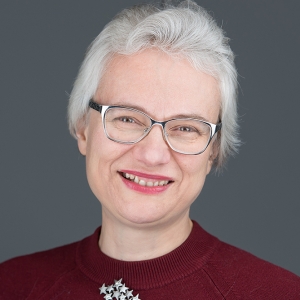Rebecca Koopmann, professor and chair of physics and astronomy, has been awarded a $215,316 “Special Projects in Astronomy” grant from the National Science Foundation (NSF) for her collaborative research project “Enhancing Undergraduate Research Experiences through Extragalactic Radio Astronomy.”
This grant offers continued support for the highly-successful Undergraduate ALFALFA Team (UAT), which has over the past 8 years provided research-based educational opportunities for 253 students closely collaborating with 25 faculty from a diverse range of universities. Astronomy faculty from 20 institutions carry out several related scientific programs that involve a radio survey of hydrogen in and around nearby galaxies. They obtain new data at several observatories and analyze catalog data obtained at Arecibo Observatory in Puerto Rico. Undergraduates will be intimately involved in all aspects of the scientific program, including planning and carrying out the observations. They will attend an annual workshop at either Green Bank Observatory or Arecibo Observatory. This program serves as a prime example of the value of scientific collaboration, particularly for faculty and students at isolated schools, and of the importance of research as a component of undergraduate education. This exposure to front-line astronomical research enhances the educational infrastructure and the quality of Science, Technology, Engineering, and Math (STEM) at a large number of schools. The program has an even wider impact through the curriculum and outreach materials they produce and share, and through broadening the participation of groups underrepresented in STEM. Most students who go through the program continue in STEM-related careers.
UAT projects will address major outstanding problems in astronomy and cosmology, such as the number and origin of optically-dark dwarf galaxies, the structure of large-scale filaments, pre-processing of HI gas outside clusters, and star formation in low - metallicity systems. All of these programs are enabled by and make use of the ALFALFA (Arecibo Legacy Fast ALFA) HI survey, as well as new observations. The main components of the program are (1) an annual workshop at either Arecibo Observatory or Green Bank Observatory; (2) observing runs at these and other radio and optical facilities; (3) summer and academic year undergraduate research projects; (4) collaborative research among faculty and students at the member schools. The broader impact also has 4 main components: (1) enhancement of undergraduate education through direct involvement in research; (2) enhancement of educational infrastructure; (3) broad dissemination of curriculum and outreach materials; and (4) broadening participation of underrepresented groups.
